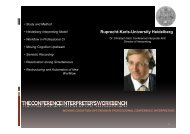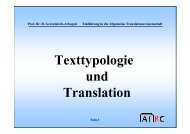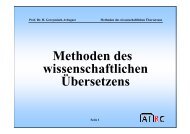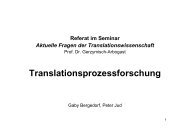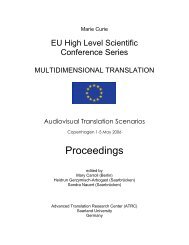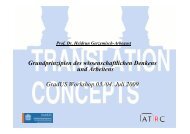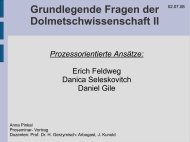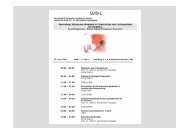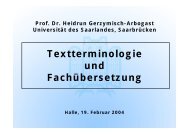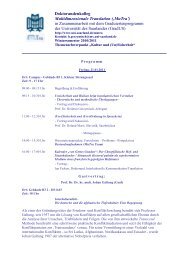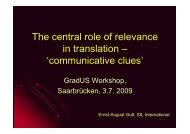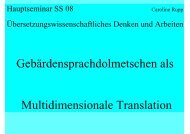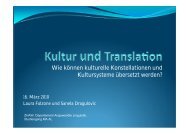Proceedings - Translation Concepts
Proceedings - Translation Concepts
Proceedings - Translation Concepts
Create successful ePaper yourself
Turn your PDF publications into a flip-book with our unique Google optimized e-Paper software.
MuTra 2005 – Challenges of Multidimensional <strong>Translation</strong>: Conference <strong>Proceedings</strong><br />
Mira Kadric<br />
matter of the lessons and the discussions was non-verbal means of communication like bodyrelated<br />
means of expression and communication objects. 63.8% of the interviewees said that<br />
they had “greatly profited” from the newly acquired transfer competence. 34.6% had “partly<br />
profited” and two participants claimed not to have profited from this exercise.<br />
The objectives regarding the role of interpreters are very different among communicating<br />
partners in public authorities, which on the one side are the parties and on the other the<br />
administrative representatives. Both sides expect the interpreters to be “loyal” to them in the<br />
sense that the interpreter should represent their individual objectives. Regarding this problem,<br />
we discussed and practiced situations during the seminar with the aim of dealing with the<br />
expectations of the communicating parties and their demands on the interpreters. In assessing<br />
the question on behavioural competence, 66.9% of the participants claimed to have “greatly<br />
profited”, 32.3% to have “partly profited” and one participant had ‘not profited’ from this part<br />
of the seminar.<br />
44.6% out of the 130 participants who had filled in the questionnaire said they had<br />
“greatly profited” from their newly acquired self-confidence. A somewhat larger percentage<br />
of 50.8% of the participants claimed they had only “partly profited” and 4.6% thought that<br />
they had ‘not profited’ as regards this competence. As regards this issue of acquired selfconfidence,<br />
it should be mentioned that during group discussions and exercises on the topic<br />
about the role, the tasks and the self-confidence of court interpreters, participants often had<br />
different opinions. Translators, interpreters, philologists and lawyers already had a specific<br />
image of this profession, while “natural” translators and interpreters were of the opinion that<br />
translating and interpreting was a service and that the client was the one who determined the<br />
tasks, the amount to be translated or interpreted and even the partiality towards one of the<br />
communicating parties. At the end of the discussions the “natural” translators and interpreters<br />
mostly admitted they had been quite unsure about this issue. Let us recall the distribution of<br />
participants according to their training: 47% of the participants were translators, interpreters,<br />
philologists or lawyers, while 53% were participants with a different educational background,<br />
who act as “natural” translators or interpreters. In analogy to these figures we could suppose<br />
that those 44.6% of course participants who had “greatly profited” from the self-confidence<br />
acquired during the seminar belonged to the group of ‘newcomers’. Those 50.8% who<br />
claimed to have only ‘partly profited’ or the 4.6% who had “not profited” at all could belong<br />
to the group of those participants who had already had training in the field of translation,<br />
interpretation, language studies or law.<br />
64.6% of the participants had “greatly profited” from the interchange and discussion with<br />
their colleagues. 32.3% had “partly profited” and 3.1% had “not profited” at all. The overall<br />
evaluation of this point depended, of course, on how the groups were put together in the<br />
individual seminars. However, we can say that the course participants profited in the<br />
discussions from the heterogeneity of the groups.<br />
The last question about the personal gain in knowledge is also of great importance for this<br />
study: “Can you apply the competences acquired in German during the seminar in your<br />
individual working language(s) without difficulty?” The participants could choose from three<br />
responses: “yes, very well”, “partly” and “not very well, because…”.<br />
187



